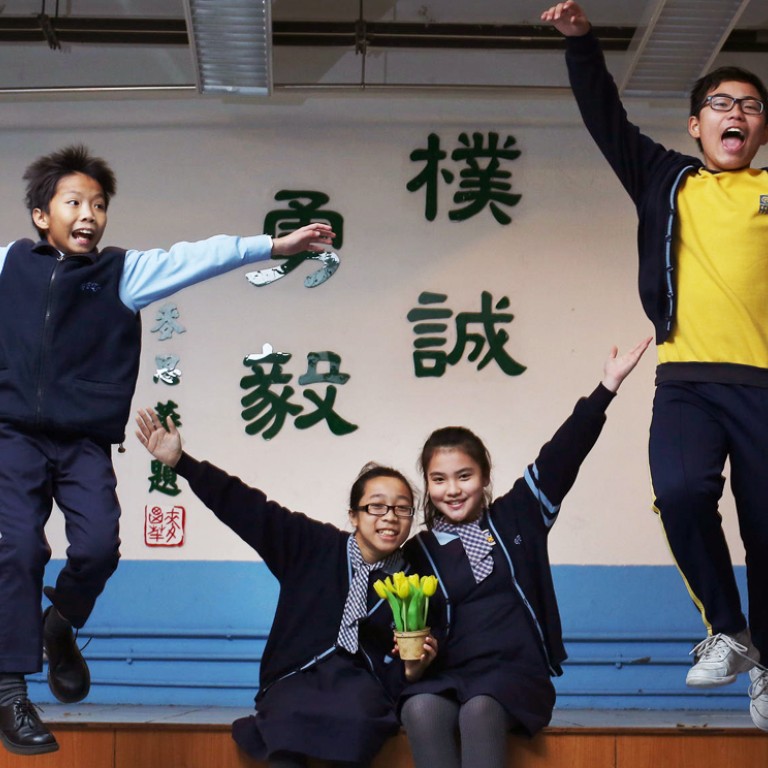
Hooray for exchanges? Hong Kong seeking to deepen students’ understanding of mainland
Plan to more than double funding of educational ties with mainland raises political suspicions … and a probing response from pair in Primary Six
Hong Kong is seeking to deepen students' understanding of the mainland by boosting its funding of exchange activities to at least HK$269 million a year by 2018, according to Chief Executive Leung Chun-ying's policy address and a government source.
Most of the funding will go towards three major exchange schemes starting from September. The amount is more than double current annual subsidies of about HK$120 million.
[There is] obviously a political agenda behind the measures
The city will also improve the curriculum for Chinese history and world history, which are compulsory at the lower secondary levels, to "reinforce pupils' interest in and understanding of Chinese history and culture".
Critics questioned the intention behind the generous mainland-linked policies for the young, fearing a revival of the controversial national education curriculum, which was criticised as "brainwashing" and shelved after protests in 2012.
In yesterday's speech, Leung announced pilot subsidies over three years for government-funded schools that formed long-term exchange ties with their mainland counterparts.
That "sister school scheme" started in 2004, but it has not previously been funded by the government.
Participating local schools now number 300, and Leung hoped the "financial and professional support" provided under the pilot programme would attract another 300 by the 2017-18 academic year.
"Our country is developing rapidly," he said. "This will further promote experience-sharing between sister schools."
A government source familiar with education policies said the government expected to spend HK$190 million during the three years, giving each school HK$120,000 a year to hold exchange activities.
The second exchange scheme involved helping pupils to join mainland programmes at least once in primary school and once in secondary school, Leung said.
Currently, each pupil gets the subsidy only once, at either the primary or secondary stage. That costs HK$73.4 million a year for about 60,000 children.
The source said that with the increased participation, the annual subsidy would rise to HK$111.8 million by 2017-18.
Under the third scheme, students aged between 12 and 29 years old are to get more money to take part in exchange and internship programmes.
The source said this would again apply only to mainland tie-ups. Annual funding would go up from HK$45 million to HK$85 million, while the number of subsidised places would also be raised from 12,700 to 19,300.
Regarding the review of the history curriculum, the source said modern Chinese history might be accorded greater coverage. That could involve more Hong Kong history, more cultural history and the positioning of Chinese history in the context of world history.
The source said the exchange activities would not be compulsory and parents would be free to decide whether to let their children take part.
Pan-democratic lawmaker Ip Kin-yuen, of the education sector, said there was "obviously a political agenda behind the measures", noting that after Occupy Central many Beijing officials had criticised Hong Kong students for being rebellious.
He was also concerned that an increase in exchange trips would put pressure on teachers and make them "part-time tour guides".
Joshua Wong Chi-fung, founder of pro-democracy student group Scholarism, said the policies were no different from "brainwashing education", referring to the shelved national education curriculum.
Wong believed participating pupils would be shown only the beautiful side of the mainland.
Fresh Fish Traders' School pupil Jenny Chan Ka-yiu, 11, welcomed more chances to learn about the mainland. But she said she would prefer the government spent the money on areas such as helping the poor.
"Some schools are quite rich already," Jenny said. "If you give them more money, it will be quite unfair to the poor people. Some poor people have to sleep on the streets and have no welfare."
Her classmate, Jackson Pun Pak-hei, said he did not want more exchange subsidies from the government. "Why doesn't the government use the money to build more public housing or deal with the waste problem?"

